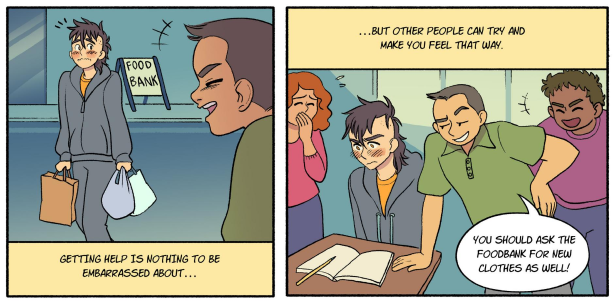David Hilferty on an inspiring project being run by West Dunbartonshire Citizens Advice Bureau
Last week I wrote here about the barriers that often prevent people from asking for support. Myths and misconceptions about people who need help must be stopped and positive interventions need to start earlier. I know that changing attitudes won't happen overnight but we must start somewhere. This week, I want to share a terrific example of how this is being done.
West Dunbartonshire Citizens Advice Bureau (CAB) has been working with pupils from a local school, St Peter the Apostle High School in Clydebank, to highlight and tackle stigma. S1 pupils were tasked with creating their own stories of how empathy and friendship can help promote better understanding. These stories were later illustrated in a series of comic books and videos by professional designers.
The 16-week project, Our Voices, Our Stories, not only explored the pupils’ experiences and views of the problem but channelled their ideas into imagining a better way was possible.
Now the pilot is complete, some of the pupils will continue as ambassadors, helping shape future sessions and inspire others across West Dunbartonshire and beyond.
Joe McCormack, manager of West Dunbartonshire CAB, says: “We just felt that tapping into the natural creativity of children and giving them a voice to express their own thoughts and experiences would help to build greater understanding of the stigma around poverty as they see it. They explored empathy and kindness as ways to challenge negative perceptions and considered how people could use local community organisations to help those who may be struggling.
“We’ve been absolutely thrilled by the results. The young people really embraced the process and came up with some strong characters and narratives.
“Their enthusiasm and commitment was a revelation, and the feedback we got from them showed that they got a lot from the experience too.
“Financial hardship impacts entire families, and that’s why we wanted to engage with younger people to let them know we are here for them too.”
Joe is right. The comic books and videos are now online and are well worth a few moments of your time: https://www.wdcab.co.uk/ovos/
What I love about this project is that it was truly born in the community. It grew out of university student Robyn Lock’s placement with the CAB, where she was exploring how poverty stigma can affect young people. Robyn and the team of CAB facilitators went into the school, directly engaging and interacting with the pupils, so the process wasn’t about cold lectures but about storytelling, creativity, and co-production.

The pupils brought incredible honesty and imagination to the work, and what they've created is both moving and meaningful. I was fortunate enough to be invited along to the launch event and it was a real privilege to see their voices at the centre of something that now has the potential to shape practice and policy.
A project like this mustn’t be an isolated example. We’re now planning to see if other CABs can replicate it in other communities across Scotland. Because to change the system, we first need to change the story.
David Hilferty is Director of Impact at Citizens Advice Scotland.
This column was first published in the Herald.







